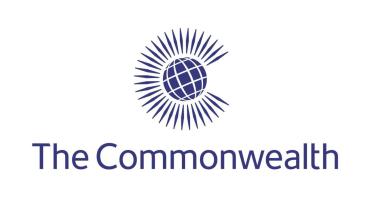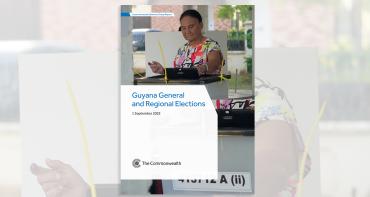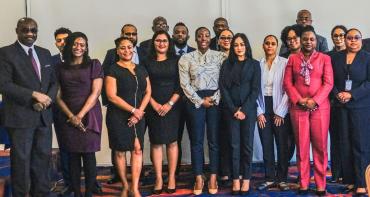"Final results still awaited but up to now the process has been well managed and generally peaceful. Some concerns regarding aspects of the campaign but overall the election represents further progress for Guyana"

The Commonwealth Observer Group has been present in Guyana since 21 November 2011. During this period we met with the Guyana Elections Commission (GECOM), representatives of political parties, civil society, media and Commonwealth High Commissions, as well as other international and national observers. Over the election period Commonwealth teams reported from eight of the ten Regions. Our teams observed the voting, counting and results aggregation and also met with electoral officials, national and international observers and other stakeholders in the Regions in order to build a larger picture regarding the conduct of the electoral process.
The results process is ongoing. This interim statement reflects the observations and assessments of the Commonwealth team on the electoral process up to this point. We will issue a Final Report at a later stage, containing our conclusions and recommendations on the entire process.
Key findings
- The 28 November 2011 elections in Guyana have built on the 2006 elections and, despite some shortcomings, represent further progress for the country in strengthening its democratic processes. Up to this point many of the benchmarks for democratic elections have been met, even though some concerns, notably in terms of aspects of the campaign, do remain to be addressed for the future.
- The elections were competitive, and basic freedoms of association, assembly and movement were provided for. Despite some isolated incidents the election campaign was generally peaceful. It was very positive that the Code of Conduct for Political Parties was signed by all of the parties. However, concerns were raised with us that the Code was not wholly respected and that state resources were used in the interests of the ruling party.
- The Code of Conduct for the Media commits media to provide “balanced, fair and accurate information” as well as an “equitable share of election coverage to all registered parties”. However, a lack of independence and impartiality of the media remains a problem. In particular, reporting from GECOM's Media Monitoring Unit shows that state-owned TV, radio and print media showed overt bias in favour of the government and ruling party in its coverage and news reporting.
- As a consequence of the overt media bias and the resources at the disposal of the incumbent, there was not a sufficiently level playing field for the campaign. While the development of codes of conduct for parties and media is welcomed, it is not enough for them merely to be signed by stakeholders. Such codes must also be respected and, where necessary, include mechanisms for enforcement.
- GECOM appears to have been well prepared for the election. Voter registration, which has so bedevilled some past elections, was much improved and generally provided for universal suffrage. Election materials, such as polling station kits, were distributed in good time to ensure the timely opening of the polls and polling staff were well trained for their respective duties, contributing to the success of the process.
- On the day of the election, voting proceeded generally smoothly. Commonwealth teams reported that overall the process was well managed and that polling staff worked diligently to process voters. Polling stations opened on time, the secrecy of the vote was provided for, political parties had their agents in polling stations, and voters were free to express their will. Some isolated incidents of disturbance occurred, notably in South Georgetown, and some anomalies were reported, but overall Commonwealth Observers reported that voting proceeded well across the country.
- Commonwealth teams followed the count at polling stations and reported that the process was transparent and electoral officials worked diligently to complete the count at the polling station level. The final aggregation of results is on-going, and has been affected somewhat by the large number of recounts requested by the PPP/C, but we continue to follow this critical aspect.
At this crucial stage of the process, the Commonwealth Observer Group urges all Guyanese to continue to exercise patience and to allow GECOM to conclude the tabulation and finalisation of results. For GECOM it is paramount that the process is concluded in a timely and transparent manner in order to ensure accountability and to maintain confidence.
Election campaign
Based on reports we have received the election campaign seems to have been reasonably peaceful, with all parties free to undertake active campaigns. This culminated in large rallies held by the PPP/C, APNU and AFC in Georgetown and regional centres. All the rallies passed off peacefully. There were reports of some isolated incidents during the campaign, such as meetings being disrupted by supporters of opposing parties, but such actions did not characterise the overall campaign. However, we did receive complaints from a number of stakeholders that, contrary to the Code of Conduct, statements were made at a rally castigating specific media practitioners and that the ruling party benefitted from the wide range of government initiatives undertaken in the lead-up to the election.
Breaches of the Media Code of Conduct were more explicit and were well documented by GECOM's Media Monitoring Unit (MMU). For instance, the MMU's analysis indicated overt bias in state-owned media in favour of the government and ruling party. For instance, for October the Chronicle newspaper's news coverage provided 95% (neutral and positive) to the government and the ruling PPP/C; NCN TV provided 74% (neutral and positive) of its news coverage to the government and the PPP/C; and, Voice of Guyana Radio provided 88% (neutral and positive) of its news coverage to the government and the PPP/C. State-owned media was not alone in providing imbalanced reporting, and all media should pursue the highest standards of professionalism and independence. However, bias by the state media was more excessive. In addition, state-owned media has a higher moral responsibility to serve the interests of all citizens, particularly as in some parts of the country it is the only media available to citizens.
Electoral framework and management of the electoral process
The electoral framework provides the basic conditions for credible and competitive elections, with the requisite freedoms provided for. Election-related laws were supplemented by the Political Party Code of Conduct and the Media Code of Conduct. It was notable for these elections that all contesting parties had, for the first time, signed up to the Political Parties Code, which is warmly welcomed. However, it is also noted that various parts of the two codes were violated and there are no enforcement mechanisms; the only means at the disposal of GECOM is to "name and shame" violators. The inability to ensure respect or to adequately sanction violations can serve to undermine the integrity of such codes.
It was reported to us that the requirement for declarations of election expenses by parties after the election is not adhered to and that the law in this regard is largely symbolic. Such an approach is not adequate and is also contradictory to the Political Parties Code of Conduct, which commits parties to “strict standards of financial probity, accountability and transparency”.
In the past, questions over voter registration have created a serious problem in Guyanese elections. It is pleasing that the massive effort exerted by GECOM appears to have largely assuaged party and public concerns in this regard. Since the 2006 elections, GECOM has conducted a new voter registration exercise resulting in a more accurate list of electors for the 2011 elections. As a consequence, while some individuals did fail to find their names on the list on election day, overall citizens were provided with the opportunity to participate.
Voting, counting and results
Commonwealth teams reported that poll officials worked methodically to process voters. GECOM was well prepared for the poll and staff seemed on the whole to be well trained. Where any problems were encountered, Returning Officers responded to resolve issues. Based on our observations voters were free to express their will. Voters waited patiently to cast their vote and the process was followed by party agents and domestic observers in the polling stations. Security at polling stations was visible and effective but not intrusive.
In some cases voters did have difficulty identifying their correct polling station and were being redirected to other stations. There were sporadic reports of problems and a small number of isolated incidents did occur, notably in South Georgetown. These appear to have been dealt with well by the police and tensions dissipated. However, in one of the incidents senior officials from the ruling party were involved, which is extremely unfortunate.
During the vote count, officials again worked hard and in a transparent manner, with party agents able to closely follow the process and able to receive a copy of the respective Statement of Poll. The tabulation and transmission process is conducted manually and is therefore prone to some delays. For instance, Guyana has a number of remote regions and a challenging terrain. There have also been challenges in rectifying small anomalies and in conducting the requested recounts. Further, the process has not been helped by various accusations and claims made by parties while the tabulation was on-going. But at this stage, GECOM is continuing to process the final result, which is expected to be completed soon.
Georgetown, 30 November 2011



